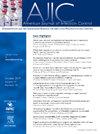对韩国 COVID-19 大流行期间使用便携式高效微粒空气过滤器的临时负压隔离病房进行入住后评估。
IF 3.8
3区 医学
Q2 INFECTIOUS DISEASES
引用次数: 0
摘要
背景:在 COVID-19 大流行期间,韩国几家医院的普通病房通过使用便携式高效微粒空气过滤器(HEPA)转换为临时负压隔离病房(TNPI)。本研究建议对 TNPI 病房进行改进,以防范空气传播的传染病:方法:通过文件审查和实地调查与员工访谈,调查了四家医院在大流行期间的现有空调系统和系统运行状况。在空置条件下进行了现场实验和测量。在所有四家医院测量了空间之间的压差(∆P),并在两家医院进行了示踪气体测试:调查结果显示,热不适导致现有系统长期处于激活状态。此外,PHU 产生的噪音导致该设备意外关闭。由于设备的运行状态,测得的 ∆P 超过 -2.5帕。因此,可以确定这些情况导致管道回流和气体通过未密封的扩散器扩散。此外,现有设施的低气密性也会影响室内环境、压差和气体扩散:结论:在将现有设施用作 TNPI 病房时,应考虑建筑气密性和现有空调系统。我们的结论是,必须提高气密性并密封未使用的扩散器,以防止不可预测的气流造成交叉感染。本文章由计算机程序翻译,如有差异,请以英文原文为准。
Post-occupancy evaluation on temporary negative pressure isolation wards with portable high-efficiency particulate air filter units used during the COVID-19 pandemic in South Korea
Background
During the COVID-19 pandemic, in South Korea, several inpatient wards were converted to temporary negative pressure isolation (TNPI) wards by using portable high-efficiency particulate air filter units (PHUs). This study proposes improvements to the TNPI ward to prepare for airborne infections.
Methods
Existing air-conditioning systems were investigated during the pandemic in 4 hospitals through a document review and field investigation with staff interviews. On-site experiments and measurements were conducted under vacant conditions. Differential pressure (P) between spaces was measured in all 4 hospitals, while tracer gas tests were carried out in 2 hospitals.
Results
The investigation revealed that thermal discomfort caused the existing systems remaining perpetually active. Additionally, the noise generated by the PHU caused an unexpected shutdown of that equipment. Furthermore, the P of over − 2.5 Pa was measured as a result of the operating status of equipment. These situations can cause duct backflow and gas diffusion through unsealed diffusers. Moreover, low airtightness of existing facilities can affect indoor environment, pressure difference, and gas diffusion.
Conclusions
When using existing facilities as TNPI wards, the airtightness and existing systems should be considered. We concluded that it is important to increase the airtightness and seal unused diffusers in order to prevent cross-infection by unpredictable airflow.
求助全文
通过发布文献求助,成功后即可免费获取论文全文。
去求助
来源期刊
CiteScore
7.40
自引率
4.10%
发文量
479
审稿时长
24 days
期刊介绍:
AJIC covers key topics and issues in infection control and epidemiology. Infection control professionals, including physicians, nurses, and epidemiologists, rely on AJIC for peer-reviewed articles covering clinical topics as well as original research. As the official publication of the Association for Professionals in Infection Control and Epidemiology (APIC)

 求助内容:
求助内容: 应助结果提醒方式:
应助结果提醒方式:


